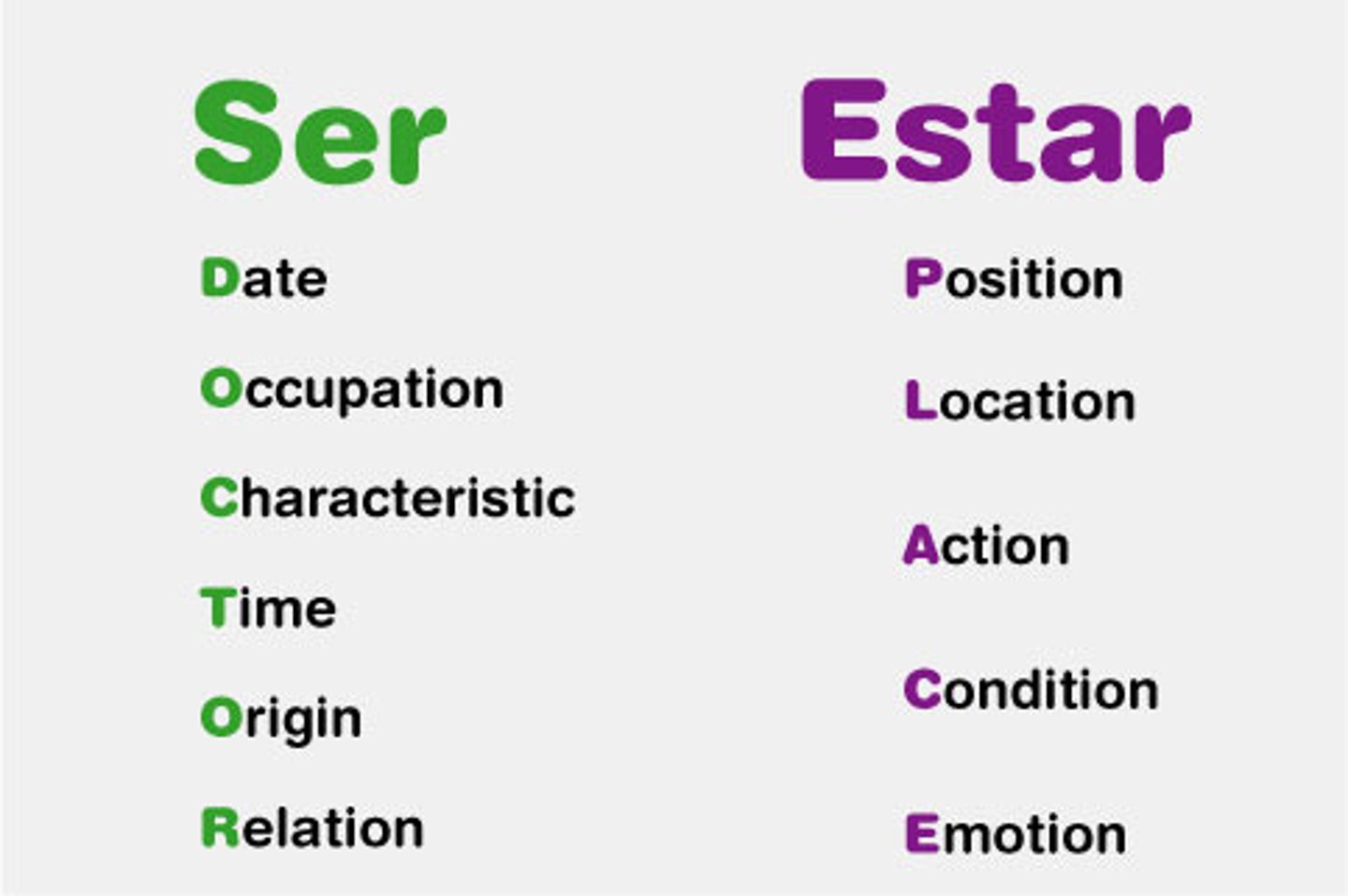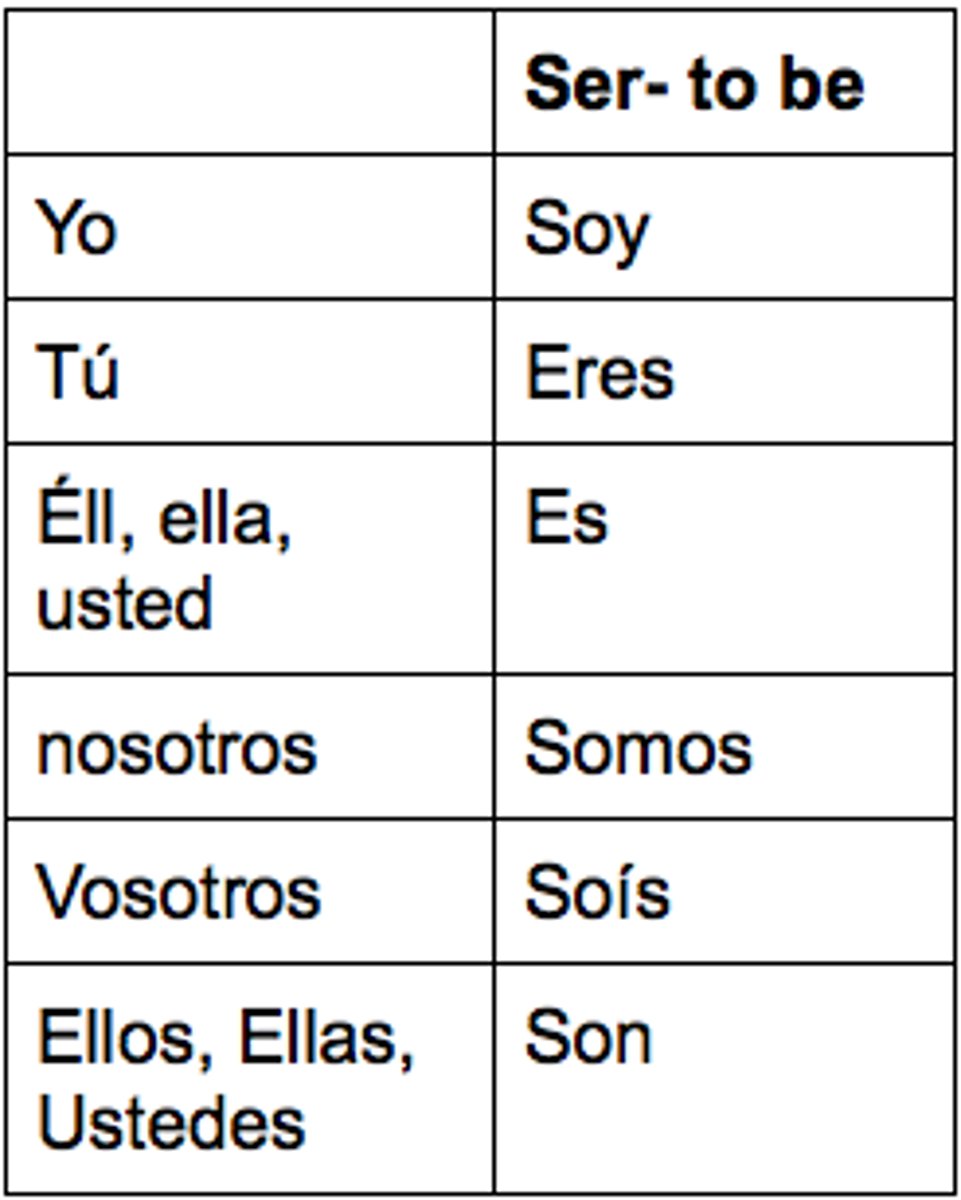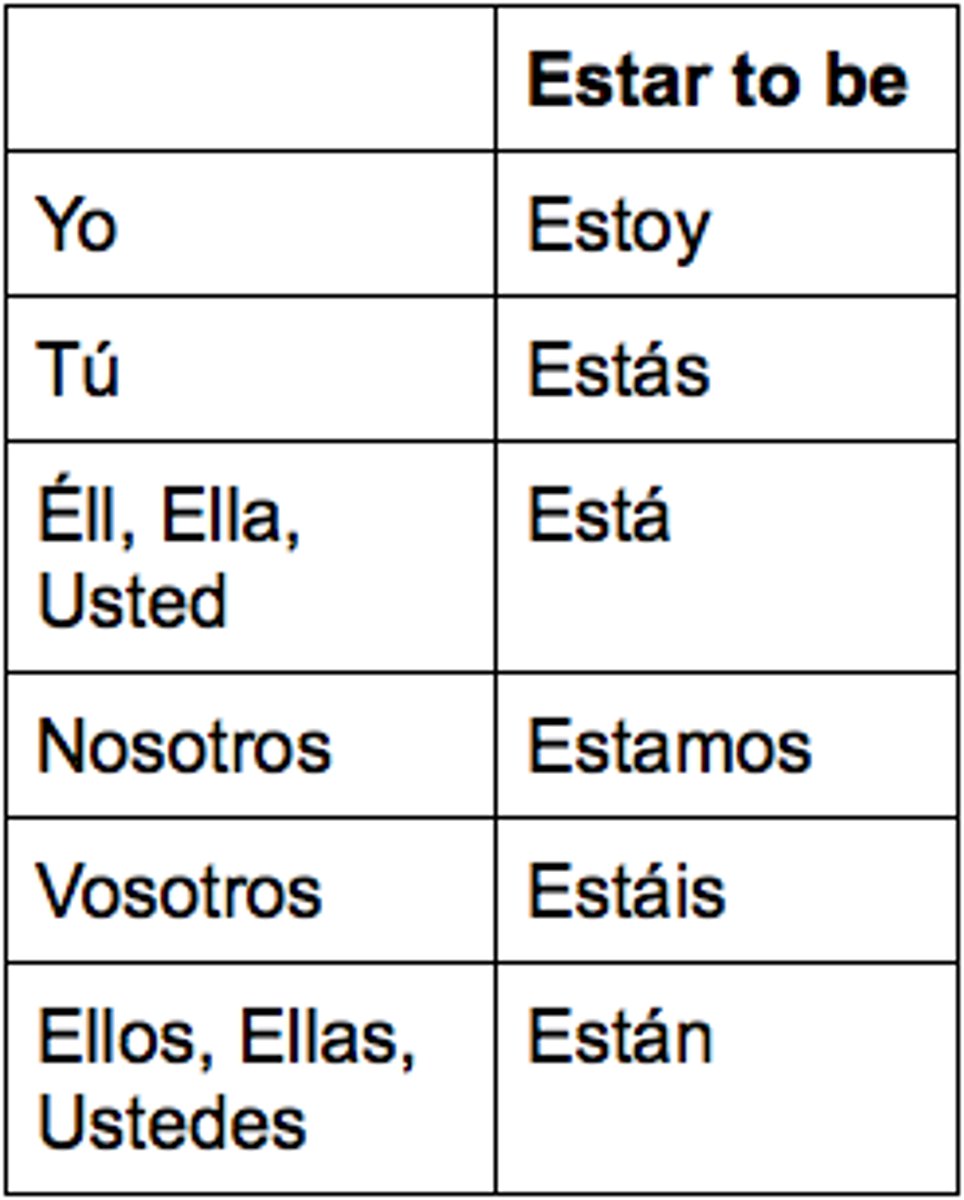Pre-AP Spanish Grammar Final Exam
1/45
There's no tags or description
Looks like no tags are added yet.
Name | Mastery | Learn | Test | Matching | Spaced | Call with Kai |
|---|
No analytics yet
Send a link to your students to track their progress
46 Terms
Ser vs. Estar

Conjugate ser in present tense

Conjugate estar in present tense

Conjugate ser in past tense

Conjugate estar in past tense
estuve
estuviste
estuvo
estuvimos
X
estuvieron
Conjugate ser in subjuntivo
sea
seas
sea
seamos
X
sean
Conjugate estar in subjuntivo
esté
estés
esté
estemos
X
estén
Conjugate ser in futuro
seré
serás
será
seremos
X
serán
Conjugate estar in futuro
estaré
estarás
estará
estaremos
X
estarán
Conjugate ser in condicional
sería
serías
sería
seríamos
X
serían
Conjugate estar in condicional
estaría
estarías
estaría
estaríamos
X
estarían
Conjugate ser in imperfecto del subjuntivo
fuera
fueras
fuéramos
X
fueran
Conjugate estar in imperfecto del subjuntivo
estuviera
estuvieras
estuviera
estuvieramos
X
estuvieran
What are los verbos del subjuntivo emoción?
alegrarse de - to be glad
encantar - to like a lot
enojarse - to be mad
senitr - to feel
estar emocionado/a - to be excited
tener miedo de - to be afraid
gustar - to like
estar triste - to be sad
What is the equation for los verbos del subjuntivo emoción?
sujeto 1 + verbo de emoción + que + sujeto 2 + subjuntivo + fin
What are los verbos del subjuntivo recomendación?
recomendar - to recommend
sugerir - to suggest
pedir - to ask
aconsejar - to advise
mandar - to order
prohibir - to prohibit
insistir - to insist
What is the equation for los verbos del subjuntivo reocmendación?
sujeto 1 + verbo de recomendación en presente + que + sujeto 2 + subjuntivo + fin
What are los verbos del subjuntivo duda?
dudar - to doubt
no estar acuerdo - to not agree with
no estar seguro - to not be sure
What is the equation for los verbos del subjuntivo duda?
sujeto 1 + verbo de duda + que + sujeto 2 + subjuntivo + fin
What is the equation for subjuntivo de ojalá?
Ojalá + que + sujeto + subjuntivo + fin
What are los verbos del subjuntivo deseo/esperanza?
querer - to want
desear - to desire
esperar - to wish
What is the equation for subjuntivo de deseo/esperanza?
sujeto 1 + verbo de deso/esperanza en presente + que + sujeto 2 + subjuntivo + fin
What are the futuro endings?
é
ás
á
emos
X
án
What are the condicional endings?
ía
ías
ía
íamos
X
ían
What are the irregular verbs in futuro and condicional?
hacer - har
haber - habr
tener - tendr
venir - vendr
poner - pondr
saber - sabr
poder - podr
querrer - querr
decir - dir
caber - cabr
What are the expressiones impersonales con subjuntivo?
es bueno/malo
es necesario
es importante
es imposible
es probable
es increíble
es posible
es preciso
es ridículo
es raro
What is the equation for expressiones impersonales con subjuntivo?
expresion impersonal + que + sujeto 1 + subjuntivo + fin
Wjhat are the equations for para and para que?
para - para + infinitivo
para que - para+ que + sujeto + subjuntivo
What are the pretérito conjugations for -ar?
é
aste
ó
amos
X
aron
What are the pretérito conjugations for -er, -ir?
í
íste
ío
imos
X
ieron
What is the pretérito for -car, -gar, -zar? ex. almorzar, jugar, buscar
yo changes to que, gue, and ce respectively,
ex. almorce, juegue, busque
poner in pretérito
puse
pusiste
puso
pusimos
X
pusieron
ser/ir in pretérito
fui
fuiste
fue
fuimos
X
fueron
saber in pretérito
supe
supiste
supo
supimos
X
supieron
hacer in pretérito
hice
hiciste
hizo
hicimos
X
hicieron
querer in pretérito
quise
quisiste
quiso
quisimos
quisieron
tener in pretérito
tuve
tuviste
tuvo
tuvimos
X
tuvieron
dormir in pretérito
dormí
dormiste
durmío
dormimos
X
durmieron
How to form mandatos informales negativo y afirmativo in sing. and plural?
afirmativos: change ending to 3rd person singular or 3rd person plural
negativos: add no to the beginning and change ending to 2nd person of opposite conjugation (-ar to -ir, -er)
How to form mandatos formales negativo and afirmativo in sing. and plural?
afirmativo: change ending to opposite ending 3rd person sing. or 3rd person plural
negativo: add no to the beginning
por vs para
por:
passing through, general location, length of tiem, cost of something, an exchange, in place of, the means for an end, cause/reason, gratitude, frequency, and on behalf of
para:
to whom, destination, recipient, purpose, an opinion, to compare, deadline, and occupation
What are the rules for accento in commands?
A verb with one syllable accompanied by one direct object, indirect object, or reflexive object, there is no accent.
Ex. Dar / a mi --> Dame
Irse / tu --> Vete
A verb with one syllable accompanied by two direct objects, indirect objects, or reflexive objects, there is an accent on the third syllable.
Ex. Decir / el secreto / a ella --> Díselo
Ponerse / la falda --> Póntela
A verb with two or more syllables accompanied by one direct object, indirect object, or reflexive object, there is an accent on the third syllable.
Ex. Traer / el libro --> Tráelo
Escribir / a ellos --> Escríbeles
A verb with two or more syllables accompanied by two direct objects, indirect objects, or reflexive objects, there is an accent on the fourth syllable.
Ex. Buscar / los cuadernos / para mí --> Búscamelos
para vs para que equations
para + infinitivo
para + que + sujeto + subjuntivo
What is the meaning of hasta que?
until
What is the equation for hasta que + subjuntivo en futuro?
verbo en futuro + direct object + hasta que + subjuntivo
What are the two types of si clausulas?
Si Presente + Futuro
Si Imperfecto del Subjuntivo + Condicional